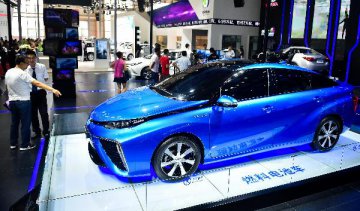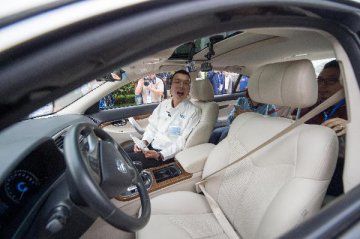Intel Corp. said Monday it is working with a unit of Alphabet Inc. to advance self-driving car technology.
Brian Krzanich, chief executive officer (CEO) of the semiconductor chip maker headquartered in Santa Clara in the U.S. state of California, foresaw driverless future as "one of the big promises of artificial intelligence (AI)."
However, in a post on Intel's website, Krzanich cited safety as the single most important reason for the company's move.
"Nearly 1.3 million people die in road crashes worldwide every year - an average 3,287 deaths a day. Nearly 90 percent of those collisions are caused by human error," he wrote. "Self-driving technology can help prevent these errors by giving autonomous vehicles the capacity to learn from the collective experience of millions of cars - avoiding the mistakes of others and creating a safer driving environment."
He noted that the newest vehicles from Waymo, formerly the Google self-driving car project and now an autonomous car development company spun out of Google's parent company, Alphabet Inc., feature Intel-based technologies for sensor processing, general compute and connectivity, "enabling real-time decisions for full autonomy in city conditions."
Waymo's self-driving Chrysler Pacifica hybrid minivans are being tested on public roads in Arizona and California.
He claimed that Waymo cars with Intel technology inside have already processed more self-driving car miles than any other autonomous fleet on U.S. roads with 3 million miles, or 4.8 million km, of real-world driving.
"As Waymo's self-driving technology becomes smarter and more capable, its high-performance hardware and software will require even more powerful and efficient compute," Krzanich wrote. "Intel's collaboration with Waymo ensures Intel will continue its leading role in helping realize the promise of autonomous driving and a safer, collision-free future."
Given the pace at which autonomous driving is coming to life, he acknowledged expecting "my children's children will never have to drive a car" and "something almost 90 percent of Americans do every day will end within a generation."
The world's largest and highest valued semiconductor chip maker by sales since 1992, Intel was overtaken by the semiconductor unit of Samsung Group in the second quarter this year.
Brian Krzanich, chief executive officer (CEO) of the semiconductor chip maker headquartered in Santa Clara in the U.S. state of California, foresaw driverless future as "one of the big promises of artificial intelligence (AI)."
However, in a post on Intel's website, Krzanich cited safety as the single most important reason for the company's move.
"Nearly 1.3 million people die in road crashes worldwide every year - an average 3,287 deaths a day. Nearly 90 percent of those collisions are caused by human error," he wrote. "Self-driving technology can help prevent these errors by giving autonomous vehicles the capacity to learn from the collective experience of millions of cars - avoiding the mistakes of others and creating a safer driving environment."
He noted that the newest vehicles from Waymo, formerly the Google self-driving car project and now an autonomous car development company spun out of Google's parent company, Alphabet Inc., feature Intel-based technologies for sensor processing, general compute and connectivity, "enabling real-time decisions for full autonomy in city conditions."
Waymo's self-driving Chrysler Pacifica hybrid minivans are being tested on public roads in Arizona and California.
He claimed that Waymo cars with Intel technology inside have already processed more self-driving car miles than any other autonomous fleet on U.S. roads with 3 million miles, or 4.8 million km, of real-world driving.
"As Waymo's self-driving technology becomes smarter and more capable, its high-performance hardware and software will require even more powerful and efficient compute," Krzanich wrote. "Intel's collaboration with Waymo ensures Intel will continue its leading role in helping realize the promise of autonomous driving and a safer, collision-free future."
Given the pace at which autonomous driving is coming to life, he acknowledged expecting "my children's children will never have to drive a car" and "something almost 90 percent of Americans do every day will end within a generation."
The world's largest and highest valued semiconductor chip maker by sales since 1992, Intel was overtaken by the semiconductor unit of Samsung Group in the second quarter this year.





















Latest comments